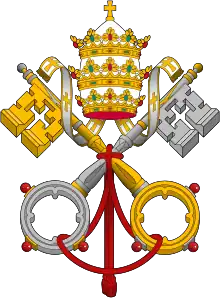Roman Catholic Diocese of Tiraspol (Russia)
The Diocese of Tiraspol was a Latin Church diocese of the Catholic Chur4ch on Czarist/Soviet-controlled territory in and around what is now the republic of Moldova. On 11 February 2002, it was suppressed, its territory being merged into the Russian Diocese of Saint Clement at Saratov.

History
In the fourteenth century the town of Tiraspol had served as the cathedral see of the Diocese of Kherson, now a titular see.[1]
The Diocese of Tiraspol (Dioecesis Tiraspolitanus) was established on 3 July 1848 on Czarist territory, split off as a suffragan see of the Metropolitan Archdiocese of Mohilev. The Catholic population was largely German in ethnic origin, although there were also significant Polish and Armenian Catholic communities. During the second half of the eighteenth century large numbers of German colonists went to Russia at the request of the Empress Catherine II. These emigrants were chiefly from Bavaria, Wurtemberg, Saxony, Alsace-Lorraine, the Tyrol, and Switzerland.[2]
The see city of the diocese was Saratov rather than Tiraspol; the choice of Tiraspol for the name of the diocese may have been because the city had been the cathedral city of the fourteenth century diocese of Kherson.[2]

The first Roman Catholic bishop of Tiraspol, appointed in 1850, was Ferdinand Helanus Kahn, OP, a German Dominican. Wincenty Lipski, a Pole, was appointed auxiliary bishop in 1856. During his tenure, the Italian Church of the Assumption in Mariupol, was opened in Mariupol, serving a community of sea captains and merchants.[3] Upon Kahn's death in 1864, he became apostolic administrator until 1872.[4]
Bishop Kessler expanded the seminary, founded a publishing house, supported the work of male and female religious orders, visited all parishes of the giant diocese, and conducted 75,000 confirmations.[5] Under Soviet rule, the diocese, as with the structures of many other churches and religious communities, was the subject of repression. Bishop Kessler went into exile in 1918,[6] and the see of Tiraspol became formally vacant on his death in 1933. Meanwhile, there were attempts to organise the diocese under a series of apostolic administrators, viz.: Johannes Roth, Aleksander Frison, and Augustin Baumtrog, but these attempts ended in increased repression, and in two cases, their execution (Frison in 1937, Roth in 1938).[7] The former St. Klemens Cathedral became a movie theatre.
The diocese lost territory in 1921 to the Romanian Diocese of Iaşi, and again on 28 October 1993, to establish the Apostolic Administration of Moldova (now the diocese of Chisinau, covering the post-soviet republic of that name).
The diocese remained inactive, but formally in existence, until its formal suppression in 2002, when the new diocese of St Clement in Saratov was erected, incorporating territory within Russia belonging to the former diocese of Tiraspol. Territory of the former diocese now situated in Moldova and Transnistria was assigned to the Apostolic Administration of Moldova, erected in 1993. Territory of the former diocese in southern Ukraine is now part of the Diocese of Odesa-Simferopol.
Bishops

- Ferdinand Helanus Kahn, Dominican Order (O.P.) (1850.05.20 – death 1864.10)
- Auxiliary Bishop Wincenty Lipski (1856.09.18 – 1872)
- Franz Xaver von Zottman (1872.02.23 – 1889.12)[8]
- Anton Johann Zerr (1889.12.30 – 1902.06.06), previously Titular Bishop of Diocletianopolis & Auxiliary Bishop of Tiraspol (1883.03.15 – 1889.12.30); later Titular Bishop of Salona (1925.11.23 – 1932.12.15)
- Eduard Baron von der Ropp (1902.06.09[9] – 1903.11.09); later Bishop of Vilnius (Lithuania) (1903.11.09 – 1917.07.25), then staying Apostolic Administrator of Vilnius a while (1917.07.25 – 1918.10.23) when promoted Metropolitan Archbishop of Mohilev (Belarus) (1917.07.25 – 1939.07.25)
- Josef Alois Kessler (1904.04.01 – 1930.01.23), later Titular Archbishop of Bosporus (1930.01.23 – 1933.12.09).
References
- Gams, Pius Bonifacius. Series episcoporum Ecclesiae Catholicae, Leipzig 1931, p. 365
- Lins, Joseph. "Tiraspol." The Catholic Encyclopedia Vol. 14. New York: Robert Appleton Company, 1912. 27 May 2023
 This article incorporates text from this source, which is in the public domain.
This article incorporates text from this source, which is in the public domain. - Dundovich, Elena; Guercetti, Emanuela; Gori, Francesca, eds. (2003). Reflections on the Gulag: With a Documentary Index on the Italian Victims of Repression in the USSR. Vol. 37. Fondazione Giangiacomo Feltinelli. p. 147. ISBN 9788807990588. Retrieved 12 July 2022.
- Nitecki, Piotr (2000). Biskupi Kościoła w Polsce w latach 965-1999. Warszawa: Instytut Wydawniczy Pax. ISBN 9788321113111.
- Osipova, I. and Chaplizky, F. B., "Martyrology of the Catholic Church in the USSR"(Rus), ISBN 5-89163-048-6
- Joseph Aloysius Kessler Archived 2009-02-10 at the Wayback Machine in the Center for Volga German studies at the Concordia University, Portland.
- Catholic Russia
- "Zottmann, Franz Xavier Aloysius", The Volga Germans, Concordia University
- Ex actis consistorialibus, Acta Sanctae Sedis, Volume 34 (1902), p. 656
